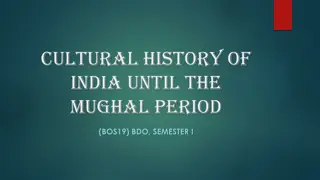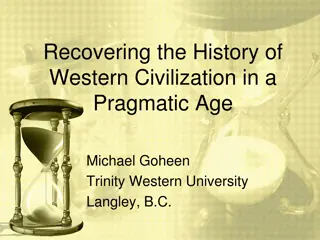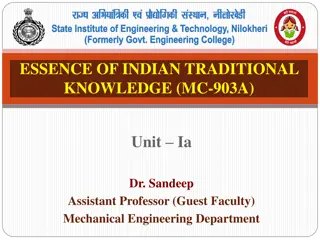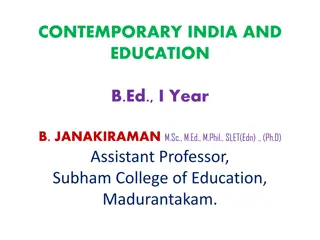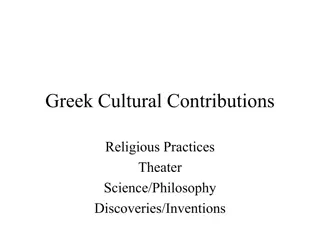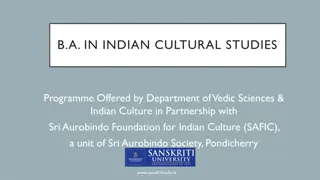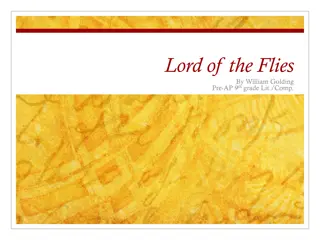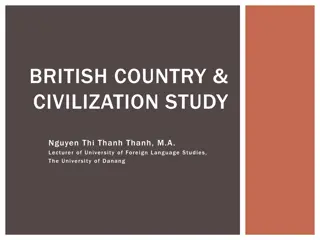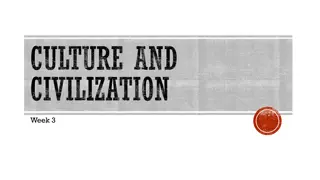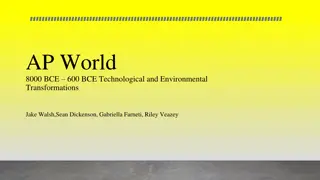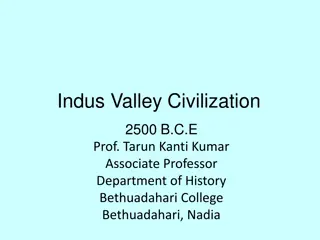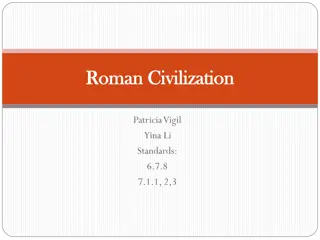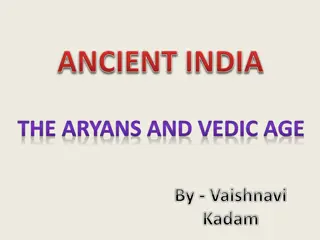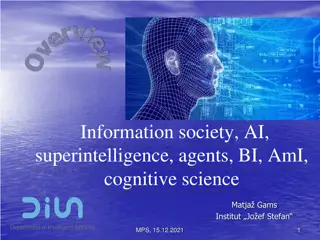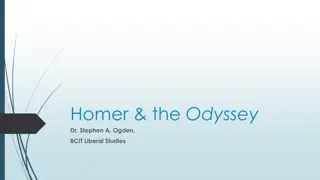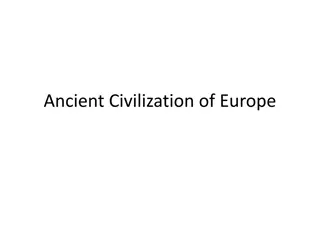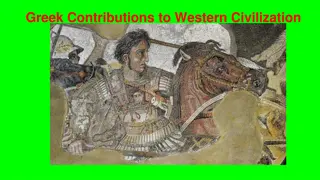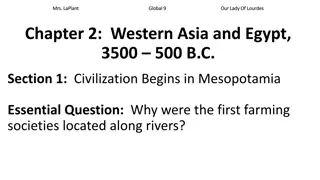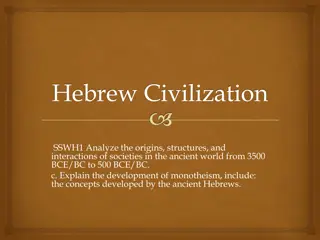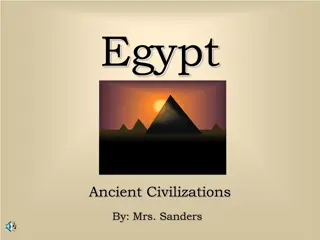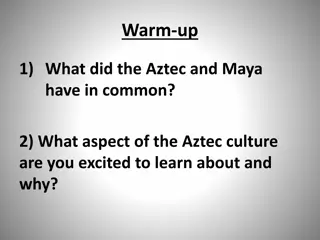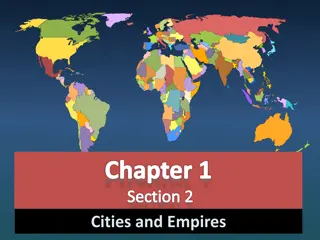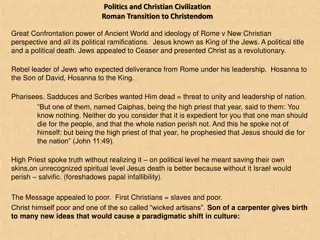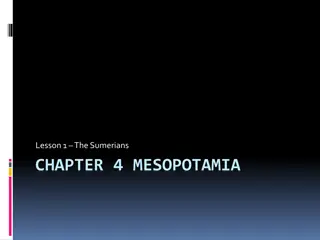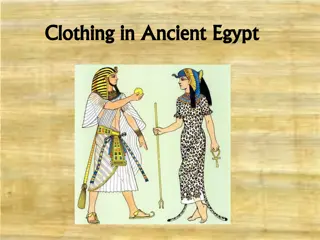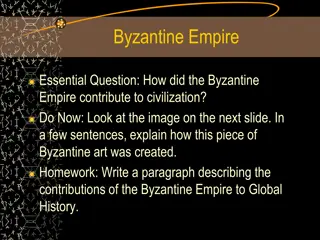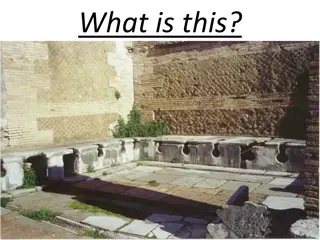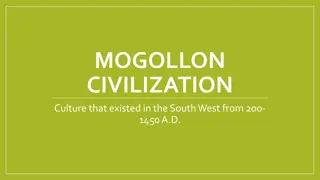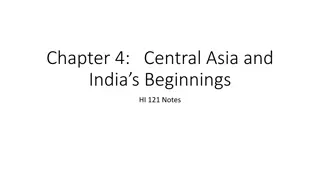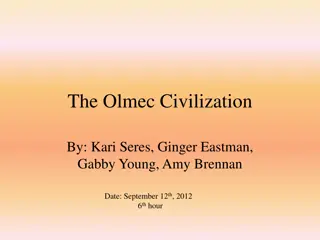Education in Ancient India: Vedic System Overview
The history of education in ancient India traces back to the Vedic system, rooted in the Vedas and emphasizing self-realization and liberation. The curriculum included Vedic literature, arithmetic, geometry, and spiritual studies, fostering academic freedom and discipline among students.
0 views • 9 slides
Features of Jainism: An Overview Presented by Debajit Hazarika, Assistant Professor
Jainism is an ancient non-Vedic religion with roots tracing back to the times of the Indus Valley Civilization. It emphasizes non-violence, self-conquest, and spiritual liberation through 24 Tirthankaras, with Lord Mahavira being the most significant. Jainism stands out with its rejection of caste d
1 views • 7 slides
Ancient Civilization of the Indus Valley: People, Land, and Culture
The ancient Indus Valley Civilization, one of the oldest in the world, flourished in the region irrigated by the River Indus and its tributaries. Discoveries in places like Mohenjo-Daro and Harappa reveal a sophisticated urban society with advancements in crafts, trade relations with contemporary ci
1 views • 15 slides
Cultural History of India: Early Vedic Period and Aryans
The period of the Aryans in ancient India marked a transition from the Indus Valley Civilization to the Vedic Civilization. The Aryans, possibly migrants from various regions, integrated with the indigenous Dravidians to form the Vedic society. Their culture, as depicted in the Vedas and epics like
0 views • 10 slides
Uncovering the Significance of Western Civilization in a Pragmatic Era
Unveil the importance of history in Western civilization amidst a pragmatic age, exploring the impact of cultural formation, religious beliefs, and the mission to modernity. Delve into how studying history provides intellectual growth and understanding of our societal roots and beliefs.
4 views • 34 slides
Essence of Indian Traditional Knowledge: Vedic Culture and the Vedas
The Vedas, ancient religious texts of Hinduism, are considered among the oldest in the world, passed down orally before being written in the Vedic Period in India. They contain knowledge about existence, not revealed at a specific historical moment but perceived by sages through deep meditation.
0 views • 41 slides
Vedic Education System in Contemporary India: A Historical Overview
Explore the roots of education in pre-independent India, focusing on the Vedic system with its objectives, curriculum, and Gurukula education model. Learn about the teacher-student relationship and the central role of the teacher in shaping learners' lives. Discover the spiritual and intellectual de
0 views • 22 slides
Rise of Janapadas and Mahajanapadas in Vedic India
The rise of Janapadas and Mahajanapadas marked a significant transition in the political landscape of Vedic India. Janapadas, major kingdoms of that era, evolved into more powerful Mahajanapadas through territorial expansion and urbanization. The shift from tribal polities to territorial states led
0 views • 9 slides
Explore the Fascinating Wonders of Egypt's Ancient Civilization
Egypt, with Cairo as its capital, is a captivating destination in Africa with a population of 100 million. Arabic is the official language, and the currency is the Egyptian pound. Its hot, dry summers and mild winters attract millions of tourists yearly who come to experience its rich culture and hi
5 views • 16 slides
Education in Ancient India: Vedic System Overview
Education in ancient India began with teaching traditional elements like Indian religions, mathematics, and logic. The Vedic system of education was based on the Vedas, focusing on spiritual and materialistic knowledge. The ultimate aim was self-realization and liberation of the soul. The curriculum
0 views • 9 slides
Greek Cultural Contributions: From Olympics to Theater
Ancient Greek civilization made significant cultural contributions in various aspects such as religious practices, theater, and scientific discoveries. The Greeks had a rich tradition of honoring their gods through events like the Olympics and theatrical performances that continue to fascinate audie
4 views • 26 slides
B.A. in Indian Cultural Studies Programme by Department of Vedic Sciences & Indian Culture
Explore the B.A. in Indian Cultural Studies programme offered by the Department of Vedic Sciences & Indian Culture in partnership with Sri Aurobindo Foundation for Indian Culture. Delve deeper into the spiritual foundations, history, and key contributions of Indian civilization while preparing for a
0 views • 13 slides
Exploring the Depths of "Lord of the Flies" by William Golding
William Golding’s "Lord of the Flies" is a powerful allegorical novel that delves into human nature, society, and the struggle between civilization and savagery. Set in the aftermath of WWII, the story follows a group of boys stranded on an uninhabited island, each representing different facets of
0 views • 12 slides
British Country & Civilization Study: Government and Constitution Overview
The British Country & Civilization Study covers various aspects of the United Kingdom, including its government structure, constitution, history, education, and holidays. The UK is a parliamentary democracy with a constitutional monarchy, where the relationship between the State and the people relie
1 views • 41 slides
Exploring Roman Civilization: Contributions and Daily Life
Delve into the intriguing world of ancient Rome through a visual journey showcasing the impact of Roman civilization. Discover the architecture, art, infrastructure like roads and drains, calendar systems, coins, and the luxurious baths they enjoyed. Uncover the influence of the Roman Empire on vari
0 views • 20 slides
Exploring Culture, Civilization, and Tradition Through Matthew Arnold's Perspective
Delve into the intricate relationship between culture, civilization, and tradition, as perceived through the teachings of Matthew Arnold. Unveil the essence of what constitutes a cultured individual and a civilized society, while navigating the challenges posed by shifting societal dynamics. Arnold'
0 views • 12 slides
Early Human Civilization: Technological and Cultural Transformations
The transition from the Neolithic Revolution to the Bronze Age marked significant advancements in agriculture, metalworking, trade, and governance. The Neolithic Revolution brought about permanent settlements and agricultural farming, while the Bronze Age introduced widespread use of bronze and econ
0 views • 7 slides
Exploring the Indus Valley Civilization: Artifacts, Cities, and Origins
Delve into the ancient Indus Valley Civilization, dating back to 2500 B.C.E. Uncover the roots of this civilization, its carefully planned cities such as Harappa and Mohenjo-Daro, and the exquisite artifacts including pottery, metalwork, and small sculptures. Discover the intriguing early trade rout
1 views • 15 slides
Roman Civilization Overview
Roman civilization was influenced by Greek culture, as seen in their art, literature, and architecture. Roman artists and writers borrowed ideas from the Greeks but adapted them to suit their needs. They created realistic statues, innovative buildings with features like arches and domes, and iconic
0 views • 36 slides
The Aryans and Vedic Age - An Overview of Early and Later Vedic Periods
The Aryans, believed to have originated from Central Asia, played a significant role in shaping the Vedic Age in ancient India. This period saw the emergence of key political, economic, and religious developments, contributing to the foundation of Hinduism. From the Early Vedic Period characterized
0 views • 19 slides
Challenges Facing Human Civilization in the Modern Era
The content discusses various potential threats to human civilization, including superintelligence, nuclear war, environmental destruction, and demographic challenges. It highlights concerns such as fast human growth, animal extinction, and the impact on smaller nations within the EU. The implicatio
0 views • 43 slides
The Impact of Homer and The Odyssey on Western Civilization
Homer, the legendary poet behind The Odyssey, played a significant role in shaping Western civilization through his epic writings. The influence of Homer's works transcends time, setting the foundation for Western literature and study. The storytelling style of epic narratives, encompassing myth, hi
0 views • 5 slides
Ancient Greece: History and Civilization Overview
The geographical challenges of Ancient Greece led to the development of distinct communities with unique customs and beliefs. The Minoans and Mycenaeans played significant roles early on, but the Dark Ages followed the collapse of civilization post-Trojan War. Different forms of government emerged,
0 views • 11 slides
Ancient Civilization of Europe: Island of Crete and Greek Culture
Island of Crete played a significant role in the history of Ancient Europe as a cultural bridge between Asia, Africa, and Europe. The civilization on Crete, known for its advanced arts, crafts, and writing, thrived before collapsing in the 15th century BC. The Greeks, located in southeastern Europe,
0 views • 20 slides
Greek Contributions to Western Civilization
Explore the notable contributions of ancient Greece to Western civilization, including the establishment of democracy, development of the alphabet, creation of the first computer, and the origin of the Olympic Games. From democracy and language to technology and sports, the impact of Greek culture r
0 views • 18 slides
Early Civilization in Mesopotamia: Sumerian Contributions and City-States
The early civilization in Mesopotamia, particularly the Sumerians, thrived along rivers due to fertile soil from floods and the ease of irrigation. Belief in multiple gods stemmed from harsh climates. Sumerian contributions spanned political, cultural, and technological realms. City-states played a
0 views • 16 slides
Exploring the Rich Heritage of the Silk Road Civilization
Dive into the captivating history of the Silk Road civilization through maps, cultural insights, economic facets, and detailed analysis of artifacts from daily and special use categories. Uncover the diverse cultural landscape, economic significance, and manufacturing techniques that shaped this anc
0 views • 18 slides
Development of Monotheism: Ancient Hebrew Civilization Overview
Ancient Hebrew civilization, emerging around 2000 BC in Canaan, played a crucial role in the development of monotheism through Judaism. Influenced by Mesopotamia and Egypt, the Hebrews introduced monotheistic beliefs, as seen in the key features of Judaism such as the Ten Commandments. The Exodus fr
0 views • 7 slides
Exploring Ancient Egypt: Pharaohs, Pyramids, and Biblical Connections
Ancient Egypt, a cradle of civilization, thrived along the Nile River for centuries. From the rule of the pharaohs to the architectural marvels of the pyramids, this civilization left a lasting legacy. The biblical connections, such as the story of Joseph and Moses, add depth to Egypt's rich history
1 views • 15 slides
Exploring Aztec Civilization: Culture, Society, and Legends
Discover the fascinating world of the Aztec civilization through commonalities with the Maya, social structures, legends like the story of Tenochtitlan's founding, and their adaptation to the land. Uncover insights into Aztec nobles, merchants, artisans, and the geographical context of their empire'
0 views • 12 slides
Certificate Courses in Indian Cultural Studies by Department of Vedic Sciences & Indian Culture
Explore month-long certificate courses in Indian Cultural Studies offered by the Department of Vedic Sciences & Indian Culture in collaboration with Sri Aurobindo Foundation for Indian Culture. Delve into India's rich cultural heritage to gain insights into ancient wisdom traditions, prepare for con
0 views • 8 slides
Early American Civilizations: The Legacy of Mayan Civilization
Ancient American civilizations like the Maya thrived long before European arrival, building grand cities, developing advanced systems of writing and astronomy, and engaging in trade and agriculture. The Mayans, known for their religious rule, monumental architecture, and skilled astronomy, left a la
0 views • 15 slides
Transition from Roman Politics to Christian Civilization: A Paradigmatic Shift
The transition from Roman politics to Christian civilization marked a significant confrontation between the powers of the ancient world and the ideology of Rome versus the new Christian perspective. This shift had profound political ramifications, with Jesus being known as the King of the Jews, spar
0 views • 7 slides
Civilization of Sumer: Mesopotamia's First Urban Society
Mesopotamia, the cradle of civilization, saw the rise of the Sumerians in 3000 BC. Situated between the Tigris and Euphrates rivers, the Sumerians developed advanced city-states, introducing writing, agriculture, and social classes. Their legacy includes innovations in irrigation, city planning, and
0 views • 10 slides
Clothing in Ancient Egypt: Fashion and Style of the Nile Civilization
Explore the fascinating world of ancient Egyptian clothing, from linen dresses and loincloths to elaborate jewelry and makeup. Discover what men, women, and children wore in this ancient civilization and how they adorned themselves for special occasions. Uncover the significance of sandals, jewelry,
0 views • 9 slides
The Contributions of the Byzantine Empire to Civilization
The Byzantine Empire made significant contributions to civilization through art, law, religion, and centralization of government. The empire's legacy includes the preservation of Roman laws, promotion of Christianity, accumulation of church wealth, and establishment of Constantinople as a key center
0 views • 22 slides
Exploring Ancient Roman Civilization Through Images and Text
Delve into the intriguing world of ancient Roman civilization through a collection of images and text snippets. Discover the transition from the Roman Republic to the rule of Emperors, examine the behavior of Roman figures, and ponder societal norms and practices of that era.
0 views • 17 slides
Unveiling the Ancient Mogollon Civilization: Culture, Beliefs, and Achievements
Dive into the intriguing world of the Mogollon civilization that thrived in the South West from 200 to 1450 A.D. Explore their geographical presence in South Eastern Arizona and South Western New Mexico, their polytheistic religious beliefs rooted in ceremonies and rituals, and their remarkable achi
0 views • 24 slides
Early Civilizations and Trade Networks in Central Asia and India
The chapter explores the Indus Valley Civilization, early trade routes, and urbanized societies like Mohenjo-Daro and Harappa in India. It delves into the significance of Central Asia's steppe lands, the Vedic Epoch, and the cultural developments in the region during ancient times.
0 views • 19 slides
Exploring the Olmec Civilization: Origins, Culture, and Legacy
The Olmec Civilization, considered the mother civilization of Mesoamerica, emerged from competing chiefdoms where rulers served as religious leaders. They thrived in agriculture, building mounds, pyramids, and temples. Their religious practices included mound building, bloodletting, and ritual sacri
0 views • 20 slides



